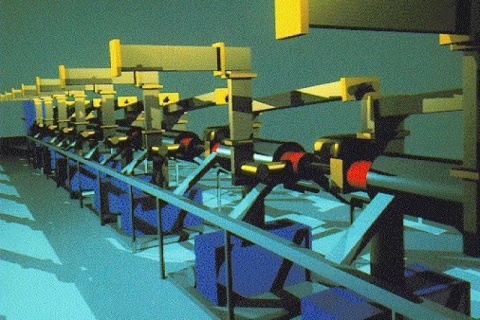
Rensselaer's Nuclear Engineering program is home to over 130 undergraduate and graduate students. With focuses on reactor physics and design, thermal-hydraulics, health physics, and reactor materials, the Nuclear Engineering program offers a diverse set of courses to fit almost any curriculum. Additionally, the program includes a competitive Senior Design Program, maintains two world-class research facilities, and is home to a highly active student section of the American Nuclear Society.
The Nuclear Engineering Program
Rensselaer launched its plan for NE research in the late 1950s when the Atomic Energy Commission funded a project to construct a linear electron accelerator in 1958 (more at http://www.linac.rpi.edu/public_html/). The NE Department was officially formed in 1960 and is one of the oldest such programs in the U.S. The construction of the accelerator facility was completed in 1961 and the facility would soon be named after Professor Gaerttner who was instrumental in establishing NE at Rensselaer and who served as NE’s first departmental head. Within a few years, the NE Department at Rensselaer awarded its first PhD degrees and then B.S. degrees.
At Rensselaer, concentrations are available in fission reactor physics, reactor engineering, health physics, thermal-hydraulics, reliability and safety, and reactor materials. Boasting unique and state-of-the-art research facilities, Rensselaer students have access to a critical reactor, a large electron accelerator, and modern computer interfacing technology. With today's need for inexpensive sources of energy, Rensselaer nuclear engineering graduates are in great demand for positions in industry or graduate study. Additionally, there are exciting possibilities in space power propulsion, fusion reactor engineering, medicine, and national defense.
For more information see the Nuclear Engineering Website.
NEUP and RPI Nuclear Engineering
RPI's nuclear engineering program is one of the programs in the U.S. that are qualified for DOE fellowships of $50,000 a year over three years for graduate students. More about the NEUP fellowship.
Student Groups
Both the NE Program and the MANE Department are home to several active student groups which supplement courses and academic work with extracurricular and off-campus experiences. The NE program is fortunate to have a very active sections of the American Nuclear Society, the professional society for nuclear engineers, and the nuclear engineering honor society Alpha Nu Sigma. Advising the MANE department, the Student Advisory Council participates in various departmental functions, including the interviewing of prospective faculty members, the production of guest lectures and seminars, and departmental representation in outreach events. Today, these groups provide the program with a wide array of student resources and activities, and also host technical presentations and seminars online.




